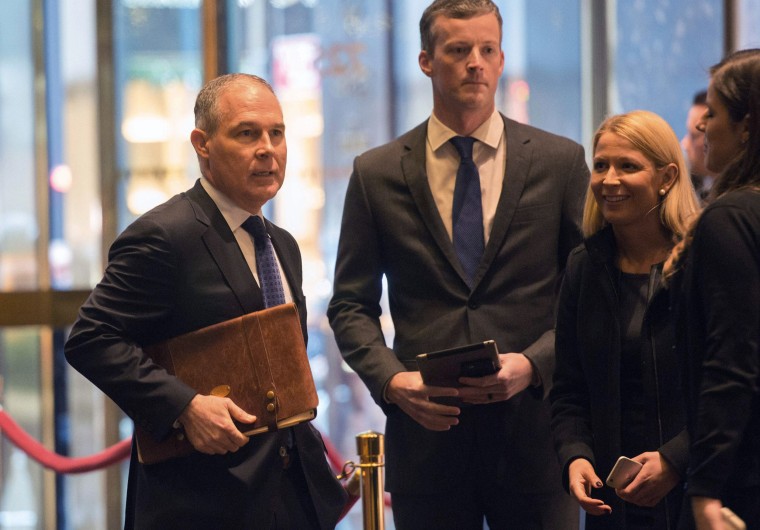As Donald Trump continues to announce administration roles, environmental experts and advocates are sounding the alarm over what they say are "extreme" selections that will put the government at odds with science and the health of the Earth.
"I think what we’re seeing is the most hard-right ideological, fossil fuel-oriented Cabinet appointments we’ve ever seen," David Goldston, Director of Government Affairs at the Natural Resources Defense Council told NBC News.
Trump’s selection of Oklahoma Attorney General Scott Pruitt for administrator of the Environmental Protection Agency was a major concern for Goldston and Christine Whitman, the former EPA Administrator under President George W. Bush from 2001-2003 and a former Republican governor of New Jersey.
Related: Poll: 50 Percent Approve of Trump's Transition Handling So Far

"This is someone who has sued the agency numerous times,” Whitman said. “He seems to have a generalized disdain for the rule making body and that’s what it does, it’s a regulatory agency.”
Pruitt has sued the agency multiple times and is currently one of a group of attorneys general leading a suit against the Obama Administration’s rules to curb carbon emissions. He also said in a 2014 op-ed that the debate over mankind’s role in climate change “is far from settled.”
"You look at that set up and it’s not a recipe for optimism"
And Trump’s picks of former Texas Governor Rick Perry for secretary of energy and Montana Rep. Ryan Zinke for secretary of the interior have also expressed skepticism over climate change science or the degree to which human beings are culpable for its acceleration.
Perry also sits on the board of a few oil companies, including Energy Transfer Partners, the firm that was pushing to build the controversial Dakota Access Pipeline under Lake Oahe.
Then there was further cause for concern after Trump selected ExxonMobil CEO Rex Tillerson for secretary of state last week.
Related: Skeptics Rip Rick Perry as Trump's Pick to Lead Department of Energy
“It’s an alarming set of picks in terms of both the influence that fossil fuel interests will have in this administration, but also the lack of balance terms of picks that will protect public health and clean energy,” Jeremy Symons, Associate Vice President of Climate Political Affairs at the Environmental Defense Fund told NBC News.
"You look at that set up and it’s not a recipe for optimism,” said Jody Freeman, a former counselor for energy and climate change in the Obama White House and director of Harvard’s Environmental Law Program. "I think there’s this undercurrent of threatening the legitimacy of climate science and I think that’s very dangerous."
Experts told NBC News that, while a Trump Administration could take steps to seriously undermine key gains made under the Obama Administration, there were still significant legal constraints on what it could do to unravel major, longstanding environmental protections.
Trump himself has expressed views on climate change ranging from calling it a hoax perpetuated by China, to telling the New York Times in an interview last month that he would keep an “open mind” on the issue, to telling Fox News earlier this month "nobody really knows" if it's real.
Related: Breaking the Ice: Obama Seeks to Cement Climate Change Legacy
Despite the variations in his statements, Freeman said, "the proof is in the pudding, and that means we ought to look at who he picks to run the essential agencies."
Mike Brune, executive director of the Sierra Club, echoed the sentiment, saying we should look at the track record of Trump's appointees.
"If you look at the track record of these people, we’re likely to see attempts to roll back clean air regulations, clean water regulations, endangered species protections and also pulling back or altering our international efforts," he said.
Some recent environmental gains likely to come under fire from Trump's administration, experts said, included the landmark Paris climate deal and policies such as the Clean Power Plan.
Goldston said that while Trump would face a long and arduous process if he wanted to completely back out of the climate agreement, he could take the route of “making it harder for the United States to meet its obligations.”
And many have noted that just because Trump voters wanted "change" of some sort, that doesn't mean they are clamoring for an anti-environmental agenda.
"In no way did the election give Trump or these nominees or his allies in Congress a mandate to undermine recent environmental progress or bedrock environmental protections," said Tiernan Sittenfeld, the senior vice president for government affairs at the League of Conservation Voters. "People did not realize what was at stake."

The climate deal was negotiated by more than 190 nations in Paris last year, and requires all participating nations to reduce greenhouse emissions with the goal of keeping the rise in global temperatures "well below" 3.6 degrees Fahrenheit from pre-industrial times to the end of this century. Scientists have said the consequences of climate change and rising global temperatures include more intense heat waves, rising sea levels, loss of glaciers, more powerful storms and habitat loss.
"If you look at the track record of these people, we’re likely to see attempts to roll back clean air regulations, clean water regulations, endangered species protections and also pulling back or altering our international efforts"
Freeman added that Trump could undermine the U.S.’s commitment by “just failing to push forward on things like the Clean Power Plan and other plans to cut our green house emissions.”
Obama unveiled the Clean Power Plan in 2015 with the aim of reducing carbon pollution from power plants. The Supreme Court stayed implementation of the plan in February pending judicial review, prompted by the lawsuits Pruitt supported. The D.C. Circuit Court of Appeals is currently considering the legality of the rule.
Related: Obama Caps Environmental Legacy With Paris Climate Change Deal
Trump could have several paths to rolling back the plan, based on the court’s decision, Freeman wrote after the election, but he could still potentially face legal battles.
Freeman added that she "wouldn’t be surprised" if the current administration’s moratorium on new coal leases on federal lands, announced in January, were lifted “fairly quickly” as it did not go through as lengthy of a rule-making process.
Activists have also expressed concern over the fate of the controversial Dakota Access oil pipeline and privatization of tribal lands. Earlier this month, Trump’s transition team came under fire from Native American environmental activists for a proposal to privatize up to 56 million acres of tribal lands for resource extraction.
For Kandi Mossett of the Indigenous Environmental Network, privatizing Native lands is an attempt to “exploit us” for oil, gas, coal and uranium. In 2009, the Council of Energy Resource Tribes, a tribal energy consortium, estimated the worth of Indian energy resources to be upwards of $1.5 trillion — representing about 20 percent of the nation’s untapped oil and gas reserves.
Related: What's Next for the Dakota Access Pipeline? Some Protesters Wary of Future
Still, Goldston and others stressed that Trump and his picks would face an increasingly uphill battle if they attempted to attack some of the fundamental aspects of current environment protection policy.
For example, the EPA has concluded based on extensive scientific study that carbon dioxide is a pollutant, Goldston said, and “as long as that is in place, the EPA is legally bound to try to take steps to try to limit carbon pollution.”
Freeman added that Trump’s selections would not be able to simply abolish the agencies they’ve been tasked to lead, or easily dismantle key regulations.
“They can’t walk into their agencies for example and just eliminate a regulation," she said. "There’s a step by step legal process for rescinding and repealing regulations."
But supporters of Trump's choices, including the American Petroleum Institute, have said they welcome the naming of Pruitt and Perry as signs the administration would be committed to the oil and natural gas industry or favor the private sector.
Pruitt “shows that he understands how important America’s oil and natural gas industry is to our nation and to our economy,” API President and CEO Jack Gerard said in a statement.
Gerard said in a separate statement that his group looks forward to working with Perry, adding that the former Texas governor would now have the opportunity "to encourage increased exports of domestically produced natural gas."
Nicolas Loris, a research fellow at the conservative think tank The Heritage Foundation, said Trump's choices were an opportunity for private sector energy development that could still protect the environment.
“I think it is an opportunity to get back to the question of what are the legitimate functions of the federal government,” he said.

